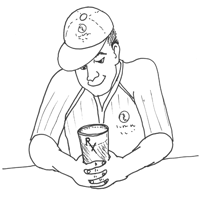STRANGE BUT TRUE- Juiced game: These beer goggles are for the fans

DRAWING BY DEBORAH DERR McCLINTOCK
Q. Can you name the major league baseball performance-enhancing drug of choice, that works by exciting certain of the brain's neurotransmitters while inhibiting others. It also causes a release of dopamine and serotonin in the brain's reward centers, bringing on feelings of well-being and euphoria. Though severe side effects come from long-term use, the medical consensus is that the drug can be used in moderate doses without creating an undue level of risk. Got a "fix" on it? Clue: Think about it through the fans' eyes.–A. Busch
A. "Diluted medical-strength beer" is already sold at many a major league venue, enhancing the fans' perception of the performance of just about everyone on the field, says Bennett Foddy, PhD, in Your Brain on Cubs: Inside the Heads of Players and Fans. If you're one of those imbibers, just be careful driving home!
Q. At the end of the 1942 film classic Casablanca, Humphrey Bogart and Ingrid Bergman stand on the tarmac as she tries to decide whether to stay with the man she loves or to board the plane and leave with her husband. Bogey turns to her and says: "Inside we both know you belong with Victor. You're part of his work, the thing that keeps him going. If that plane leaves and you're not with him, you'll regret it. Maybe not today. Maybe not tomorrow. But soon and for the rest of your life." What might a psychologist today say about Bogart's heart-wrenching advice?–I. Bergman
A. He was eloquent but wrong, and dissonance theory– how we handle our contradictory beliefs– tells us why, say Carol Tavris and Elliot Aronson in Mistakes Were Made (but not by me). Bergman would have found reasons to justify either choice, along with reasons to be glad she did not make the other.
The scene is among the most memorable in the history of cinema because most of us have stood on that same runway from time to time, says Dan Gilbert in Stumbling on Happiness.
"Our most consequential choices– whether to marry, have children, enter a profession– are often shaped by how we imagine our future regrets." But studies show that 9 out of 10 people more regret things they haven't done than things they have, including not having gone to college, not grasping profitable business opportunities and not spending enough time with family or friends.
Bogart's admonition led Bergman to board the plane and fly away with her husband. Yet, concludes Gilbert, "had she stayed with Bogey in Casablanca, she would probably have felt just fine. Not right away, perhaps, but soon and for the rest of her life."
Q. What's a fast, drug-free, cost-free way of pulling yourself out of a mild case of the blues?–B. McFerrin
A. Just act happy, says Hope College psychologist David G. Myers in The Pursuit of Happiness. Try a small smile. It'll feel good. Now try a broad smile. You'll feel even better. Doesn't matter that you're just faking it. "Going through the motions will trigger the emotions."
It's the same with gait: Take long, strong strides, arms swinging, eyes straight ahead, and you'll feel a mood upsurge; slow it to a shuffle, eyes downcast, and your spirits too will drag.
Surely you've noticed: You're in a dour mood when the phone rings, you fake a cheery tone, and by the time you hang up, the sullenness is gone. Such is the value of social occasions– calls, visits, dinners out: "They impel us to behave as if we were happy, which in fact helps free us from our unhappiness."
~
Send strange questions to brothers Bill and Rich at [email protected].
#